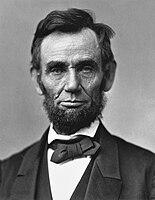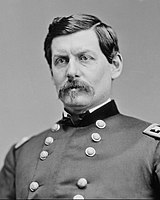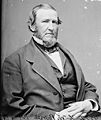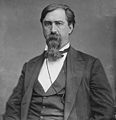
A | B | C | D | E | F | G | H | CH | I | J | K | L | M | N | O | P | Q | R | S | T | U | V | W | X | Y | Z | 0 | 1 | 2 | 3 | 4 | 5 | 6 | 7 | 8 | 9
| ||||||||||||||||||||||||||||||||
234 members[a] (+17 invalidated)[b] of the Electoral College 118 electoral votes needed to win | ||||||||||||||||||||||||||||||||
|---|---|---|---|---|---|---|---|---|---|---|---|---|---|---|---|---|---|---|---|---|---|---|---|---|---|---|---|---|---|---|---|---|
| Turnout | 73.8%[3] | |||||||||||||||||||||||||||||||
| ||||||||||||||||||||||||||||||||
 Presidential election results map. Red denotes states won by Lincoln/Johnson, Blue denotes those won by McClellan/Pendleton, and Maroon denotes non-voting Confederate states. The states of Louisiana and Tennessee, which had recently been captured from Confederate control, held elections; however, no electoral votes were counted from them.[2] One of Nevada's three electors was snowbound and unable to cast a vote for President or Vice President.[1] Numbers indicate electoral votes cast by each state. | ||||||||||||||||||||||||||||||||
| ||||||||||||||||||||||||||||||||
The 1864 United States presidential election was the 20th quadrennial presidential election. It was held on Tuesday, November 8, 1864. Near the end of the American Civil War, incumbent President Abraham Lincoln of the National Union Party easily defeated the Democratic nominee, former General George B. McClellan, by a wide margin of 212–21 in the electoral college, with 55% of the popular vote. For the election, the Republican Party and some Democrats created the National Union Party, especially to attract War Democrats.
Despite some intra-party opposition from Salmon Chase and the Radical Republicans, Lincoln won his party's nomination at the 1864 National Union National Convention. Rather than re-nominate Vice President Hannibal Hamlin, the convention selected Andrew Johnson of Tennessee, a War Democrat, as Lincoln's running mate. John C. Frémont started to run as the nominee of the new Radical Democracy Party, which criticized Lincoln for being too moderate on the issue of racial equality, but Frémont withdrew from the race in September and that new party dissolved. The Democrats were divided between the Copperheads, who favored immediate peace with the Confederacy, and War Democrats, who supported the war. The 1864 Democratic National Convention nominated McClellan, a War Democrat, but adopted a platform advocating peace with the Confederacy, which McClellan rejected. The Confederacy seemed to have survival potential in summer 1864, but was visibly collapsing by election day in November.
Despite his early fears of defeat, Lincoln won strong majorities in the popular and electoral vote, partly as a result of the recent Union victory at the Battle of Atlanta.[4] As the Civil War was still raging, no electoral votes were counted from any of the eleven southern states that had joined the Confederate States of America.[2] Lincoln's re-election ensured that he would preside over the successful conclusion of the Civil War.
Lincoln's victory made him the first president to win re-election since Andrew Jackson in 1832, as well as the first Northern president to ever win re-election. Lincoln was assassinated less than two months into his second term, and he was succeeded by his vice president, Andrew Johnson, who favored quick restoration of the seceded states to the Union without protection for the former slaves. This led to conflict with the Republican-dominated Congress, culminating in his impeachment by the House of Representatives in 1868. He was acquitted in the Senate by one vote.
Background
The 1864 presidential election took place during the American Civil War. According to the Miller Center for the study of the presidency, the election was noteworthy for occurring at all, an unprecedented democratic exercise in the midst of a civil war.[5]
A group of Republican dissidents who called themselves Radical Republicans formed a party named the Radical Democracy Party and nominated John C. Frémont as their candidate for president. Frémont later withdrew and endorsed Lincoln. War Democrats joined with Republicans as the National Union Party, with Lincoln at the head of the ticket.[6] The National Union Party was a temporary name used to attract War Democrats and Southern Border State Unionists who would not vote for the Republican Party. It faced off against the regular Democratic Party, including Peace Democrats.
Nominations
The 1864 presidential election conventions of the parties are considered below in order of the party's popular vote.
National Union Party nomination
| 1864 National Union Party ticket | |||||||||||||||||||||||||||||
| Abraham Lincoln | Andrew Johnson | ||||||||||||||||||||||||||||
|---|---|---|---|---|---|---|---|---|---|---|---|---|---|---|---|---|---|---|---|---|---|---|---|---|---|---|---|---|---|
| for President | for Vice President | ||||||||||||||||||||||||||||
 |
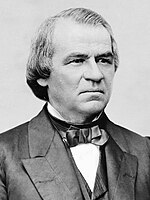 | ||||||||||||||||||||||||||||
| 16th President of the United States (1861–1865) |
Military Governor of Tennessee (1862–1865) | ||||||||||||||||||||||||||||
National Union candidates:
- Abraham Lincoln, President of the United States
- Ulysses S. Grant, Commanding General from Illinois
National Union Party presidential candidates gallery
National Union Party vice presidential candidates gallery
-
-
-
Major General Lovell Rousseau from Kentucky
Temporary split in the Republican Party
As the Civil War progressed, political opinions within the Republican Party began to diverge. Senators Charles Sumner and Henry Wilson from Massachusetts wanted the Republican Party to advocate constitutional amendments to prohibit slavery and guarantee racial equality before the law. Initially, not all northern Republicans supported such measures.
Democratic leaders hoped that the radical Republicans would put forth their own ticket in the election. The New York World newspaper, particularly interested in undermining the National Union Party, ran a series of articles predicting a delay for the National Union Convention until late in 1864 to allow Frémont time to collect delegates to win the nomination. Frémont supporters in New York City established a newspaper called the New Nation, which declared in one of its initial issues that the National Union Convention would be a "nonentity". The New York World also published false information (further purported by Samuel S. Cox) to limit Lincoln's popularity.[7]
National Union Party
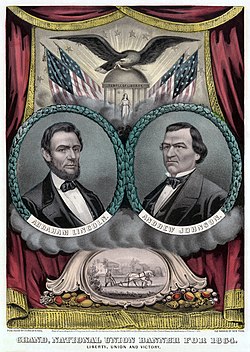
Before the election, some War Democrats joined the Republicans to form the National Union Party.[8] With the outcome of the Civil War still in doubt, some political leaders, including Salmon P. Chase, Benjamin Wade, and Horace Greeley, opposed Lincoln's re-nomination on the grounds that he could not win. Chase himself became the only candidate to contest Lincoln's re-nomination actively, but he withdrew in March when a slew of Republican officials, including some within the state of Ohio upon whom Chase's campaign depended, endorsed Lincoln for re-nomination. Lincoln was still popular with most members of the Republican Party, and the National Union Party nominated him for a second term as president at their convention in Baltimore, Maryland, on June 7–8, 1864.[9] The party platform included these goals: "pursuit of the war, until the Confederacy surrendered unconditionally; a constitutional amendment for the abolition of slavery; aid to disabled Union veterans; continued European neutrality; enforcement of the Monroe Doctrine; encouragement of immigration; and construction of a transcontinental railroad." It also praised the use of black troops and Lincoln's management of the war.[10]
With incumbent vice president Hannibal Hamlin remaining indifferent about the prospect of a second term in office, Andrew Johnson, the former senator from and current military governor of Tennessee, was named as Lincoln's vice presidential running-mate. He had been governor of Tennessee from 1853 to 1857 and was elected by the legislature to the Senate in 1857. In his congressional service, he sought passage of the Homestead Bill which was enacted soon after he left his Senate seat in 1862. When the Southern slave states, including Tennessee, seceded, he remained firmly with the Union. He was the only sitting senator from a Confederate state who did not resign his seat upon learning of his state's secession. In 1862, Lincoln appointed him as military governor of Tennessee after most of it had been retaken. In 1864, Johnson was a logical choice as running mate for Lincoln, who wished to send a message of national unity in his re-election campaign, especially to ensure the electoral votes of the border states.
Others who were considered for the nomination, at one point or another, were former Senator Daniel Dickinson, Major General Benjamin Butler, Major General William Rosecrans, Joseph Holt, and former Treasury Secretary and Senator John Dix.
Democratic Party nomination
| 1864 Democratic Party ticket | |||||||||||||||||||||||||||||
| George B. McClellan | George H. Pendleton | ||||||||||||||||||||||||||||
|---|---|---|---|---|---|---|---|---|---|---|---|---|---|---|---|---|---|---|---|---|---|---|---|---|---|---|---|---|---|
| for President | for Vice President | ||||||||||||||||||||||||||||
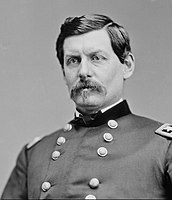 |
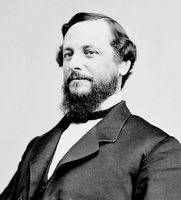 | ||||||||||||||||||||||||||||
| 4th Commanding General of the U.S. Army (1861–1862) |
U.S. Representative for Ohio's 1st (1857–1865) | ||||||||||||||||||||||||||||
| Campaign | |||||||||||||||||||||||||||||
Democratic presidential candidates:
- George B. McClellan, General from New Jersey
- Thomas H. Seymour, Former Governor of Connecticut
Democratic Party candidates gallery
Democratic Party vice presidential candidates gallery

The Democratic Party was bitterly split between War Democrats and Peace Democrats, a group further divided among competing factions. Moderate Peace Democrats who supported the war against the Confederacy, such as Horatio Seymour, were preaching the wisdom of a negotiated peace. After the Union victory at the Battle of Gettysburg in 1863, moderate Peace Democrats proposed a negotiated peace that would secure Union victory. They believed this was the best course of action, because an armistice could finish the war without devastating the South.[11] Radical Peace Democrats known as Copperheads, such as Thomas H. Seymour, declared the war to be a failure and favored an immediate end to hostilities without securing Union victory.[12]

George B. McClellan vied for the presidential nomination. Additionally, friends of Horatio Seymour insisted on placing his name before the convention, which was held in Chicago, Illinois, on August 29–31, 1864. But on the day before the organization of that body, Horatio Seymour announced positively that he would not be a candidate.
Since the Democrats were divided by issues of war and peace, they sought a strong candidate who could unify the party. The compromise was to nominate pro-war General George B. McClellan for president and anti-war Representative George H. Pendleton for vice president. McClellan, a War Democrat, was nominated for president over the Copperhead Thomas H. Seymour. Pendleton, a close associate of the Copperhead Clement Vallandigham, balanced the ticket, since he was known for having strongly opposed the Union war effort.[13] The convention adopted a peace platform[14] – a platform McClellan personally rejected.[15] McClellan supported the continuation of the war and restoration of the Union, but the party platform, written by Vallandigham, opposed this position.
Radical Democracy Party nomination

Radical Democracy Party candidates gallery
Radical Democracy Party vice presidential candidates gallery
-
General John Cochrane from New York
The Radical Democracy Convention assembled in Ohio with delegates arriving on May 29, 1864. The New York Times reported that the hall which the convention organizers had planned to use had been double-booked by an opera troupe. Almost all delegates were instructed to support Frémont, with a major exception being the New York delegation, which was composed of War Democrats who supported Ulysses S. Grant. Various estimates of the number of delegates were reported in the press; The New York Times reported 156 delegates, but the number generally reported elsewhere was 350 delegates. The delegates came from 15 states and the District of Columbia. They adopted the name "Radical Democracy Party".[16]
Zdroj:https://en.wikipedia.org?pojem=1864_U.S._presidential_election
Text je dostupný za podmienok Creative Commons Attribution/Share-Alike License 3.0 Unported; prípadne za ďalších podmienok. Podrobnejšie informácie nájdete na stránke Podmienky použitia.
Antropológia
Aplikované vedy
Bibliometria
Dejiny vedy
Encyklopédie
Filozofia vedy
Forenzné vedy
Humanitné vedy
Knižničná veda
Kryogenika
Kryptológia
Kulturológia
Literárna veda
Medzidisciplinárne oblasti
Metódy kvantitatívnej analýzy
Metavedy
Metodika
Text je dostupný za podmienok Creative
Commons Attribution/Share-Alike License 3.0 Unported; prípadne za ďalších
podmienok.
Podrobnejšie informácie nájdete na stránke Podmienky
použitia.
www.astronomia.sk | www.biologia.sk | www.botanika.sk | www.dejiny.sk | www.economy.sk | www.elektrotechnika.sk | www.estetika.sk | www.farmakologia.sk | www.filozofia.sk | Fyzika | www.futurologia.sk | www.genetika.sk | www.chemia.sk | www.lingvistika.sk | www.politologia.sk | www.psychologia.sk | www.sexuologia.sk | www.sociologia.sk | www.veda.sk I www.zoologia.sk

